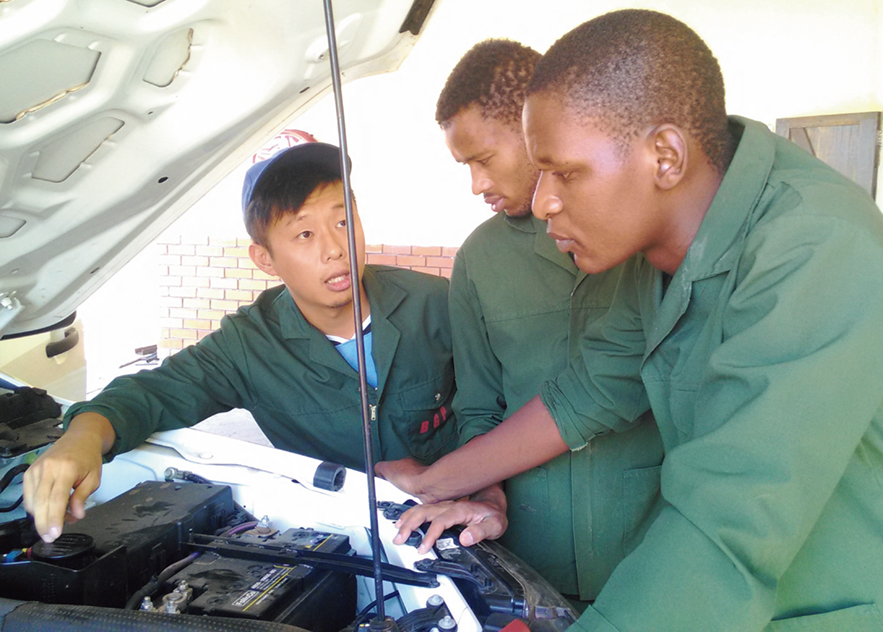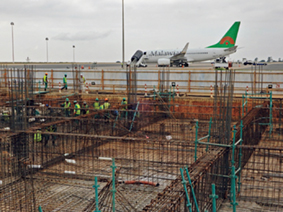Chapter 2 Specific Initiatives of Japan's Development Cooperation

A Japan Overseas Cooperation Volunteer, Mr. Yohei Fukasawa (car maintenance), providing guidance on car maintenance techniques at the Marobela Vocational Training School in the northern part of Botswana (Photo: Magandati Dabilani)
This chapter presents the specific development cooperation measures that Japan is implementing around the world. Here, the term “development cooperation” refers to “international cooperation activities conducted by the government and its affiliated agencies for the main purpose of development in developing regions,” including ODA and other cooperation conducted in collaboration with public-private financing and activities.
Section 1 Measures for Each Priority Issue
This section introduces Japan's recent efforts related to the three priority issues: “1. ‘Quality growth' and poverty eradication through such growth”; “2. Sharing universal values and realizing a peaceful and secure society”; and “3. Building a sustainable and resilient international community through efforts to address global challenges.”
1. “Quality Growth” and Poverty Eradication through Such Growth
Across the world, there is still a large number of people suffering poverty. Eradicating poverty in the world is the most fundamental development challenge. In particular, it is essential to achieve economic growth through self-reliant development of developing countries in order to resolve the poverty issue in a sustainable manner.
Such growth is not simply quantitative economic growth. It must be “quality growth” that is: “inclusive” in that the fruits of growth are shared within society as a whole, leaving no one behind; “sustainable” in that growth can be sustained in harmony with society and the environment; and “resilient” against economic crises, natural disasters and other shocks.
These are some of the challenges Japan tackled in its postwar history. Japan takes advantage of its own experience, expertise and technology as well as lessons learned in order to provide assistance to realize “quality growth” and poverty eradication through such growth.
1-1 Assistance Necessary to Secure the Foundations and the Driving Force for Economic Growth
(1) Development of Industrial Infrastructure and Industries, and Economy Policy
To achieve “quality growth,” it is important to improve the socio-economic infrastructure that serves as the foundation for the development of developing countries. In addition, it is key that the private sector plays a central role. In particular, it is essential to boost private sector activities, such as the development of industries and the expansion of trade and investment.
In developing countries beset by a variety of challenges, it can sometimes be difficult to develop capacities or set in place an environment for promoting trade and attracting private investment. Therefore, support from the international community is required.
•Malawi
The Project for Expansion of the Terminal Building at Kamuzu International Airport
Grant aid (November 2015 - )
In Malawi, a landlocked country in Africa, air transport plays a highly important role in direct trade with foreign countries. Since supporting the construction of Kamuzu International Airport in the capital city of Lilongwe through an ODA loan, etc. in 1983, Japan has been steadily implementing grant aid to update aging facilities and equipment, provide technical cooperation concerning air traffic control (ATC) duties, and establish solar power generation in order to respond to power shortages. In particular, as a result of the grant aid that Japan provided in 2012 for improving ATC equipment such as an instrument landing system, ATC safety improved, enabling aircraft to land and take off at night and in bad weather. This led to a significant expansion in the number of the airport's takeoffs and landings, from approximately 3,700 flights in 2011 to 7,000 in 2012, and in passenger numbers, from approximately 112,000 people to 195,000 in 2012.
However, more than 30 years have passed since the passenger terminal building was constructed. The structure of the building has deteriorated as a result of aging degradation, and the facilities inside the airport are deteriorating as well. The number of travelers using the airport is expected to reach 360,000 in 2025, and the airport needs to be upgraded in order to cope with this growth in user numbers. Furthermore, a new aircraft monitoring system also needs to be introduced to ensure the safety of aircraft operation.

The foundation frame construction site of the international passenger terminal arrival wing (Photo: GYROS Corporation)
Against this backdrop, Japan decided to provide support for departure and arrival wing expansions at the international passenger terminal at Kamuzu International Airport, as well as for the construction of a new domestic passenger terminal, improvements to the existing passenger terminals and the establishment of an aircraft monitoring system. The construction work began in March 2017 and is scheduled to be completed in 2019. Additionally, by ensuring the safety of aircraft operation, the project will aim to contribute to promoting greater use of the airport by airlines and travelers, thereby encouraging the movement of people across borders. Simultaneously, a technical cooperation project is also being carried out in parallel in order to develop human resources such as air traffic controllers and engineers to oversee the ongoing operation and maintenance of the aircraft monitoring system that will be introduced with this project. This can therefore be described as a highly effective project that combines financial cooperation with technical cooperation.
Kamuzu International Airport is the result of Japan's ongoing and comprehensive cooperation. It is a symbol of the history of cooperation between Japan and Malawi.
<Japan's Efforts>
•Quality Infrastructure
Japan develops quality infrastructure that leads to quality growth in developing countries and regions, in line with their economic and development strategies, and trains human resources to manage and operate this infrastructure. Japan's strength lies in developing infrastructure that is truly contributory to “quality growth” in developing countries, which includes technology transfer and job creation in partner countries.
The “G7 Ise-Shima Principles for Promoting Quality Infrastructure Investment,” which was agreed at the G7 Ise-Shima Summit in 2016, is positioned as the first step towards sharing the recognition on the basic elements of “quality infrastructure investment,” or investment on the development of infrastructure that contributes to “quality growth.” The concrete elements set forth in the Principles - namely: (i) economic efficiency in view of life-cycle cost, safety and resilience against natural disaster; (ii) job creation, capacity building, and transfer of expertise and know-how; (iii) addressing social and environmental impacts; (iv) ensuring alignment with economic and development strategies; and (v) enhancing effective resource mobilization - were shared at subsequent meetings such as the G20 Hangzhou Summit, the TICAD VI, the East Asia Summit, and the APEC Leaders' Meeting.
Furthermore, as Japan's contribution to infrastructure investment in line with the G7 Ise-Shima Principles for Promoting Quality Infrastructure Investment, Prime Minister Shinzo Abe explained to the G7 leaders the Expanded Partnership for Quality Infrastructure, under which Japan would provide financing of approximately $200 billion as the target for the next five years to infrastructure projects across the world. Moreover, at TICAD VI held in Kenya in August 2016, Prime Minister Abe announced that Japan would provide approximately $10 billion of quality infrastructure investment in Africa for the three years from 2016 to 2018.
In addition, Japan is also working with organizations such as the OECD and EU in order to promote the international standardization of quality infrastructure. In April 2017, Japan co-hosted the First International Economic Forum on Asia in Tokyo together with the OECD Development Centre and Economic Research Institute for ASEAN and East Asia (ERIA), during which participants engaged in lively discussions about quality infrastructure. During the high-level week of the UN General Assembly in September, Japan co-hosted a side event on the promotion of quality infrastructure with the EU and the UN with the attendance of Foreign Minister Kono, leading international discussions on quality infrastructure. Moving forward, Japan aims to continue promoting initiatives towards the international standardization of quality infrastructure.
•Improving the Trade and Investment Climate
Japan utilizes ODA and Other Official Flows (OOF)* to support development of small and medium-sized enterprises (SMEs), transfer of Japan's industrial technology, and formulation of economic policies in developing countries. In addition, Japan supports the development of the trade and investment climate and economic infrastructures in order to enhance the export capabilities and competitiveness of developing countries.
More than two-thirds of the World Trade Organization (WTO) Members are developing countries and the WTO emphasizes the significance of promoting their development through participation in the multilateral free trading system. Japan has contributed to the trust fund set up within the WTO with an aim to improve the capacity of developing countries to engage in trade negotiations and participate in the global market, thereby gaining the ability to implement the WTO agreements.
Regarding access to the Japanese market, Japan has implemented the Generalized System of Preferences (GSP) for developing countries, which applies lower tariff rates to products from developing countries, and duty-free quota-free access* for the Least Developed Countries (LDCs)*. These schemes are intended to encourage Japan's import of products from developing countries including the LDCs. In addition, Japan also actively promotes Economic Partnership Agreements (EPAs)* and tries to create an environment for economic growth in developing countries through liberalization of trade and investment.
In recent years, active discussions regarding Aid for Trade (AfT)* have taken place at various international organizations, including the WTO and the OECD, as a means of further promoting support by developed countries, including Japan. Japan provides assistance for the development of transportation networks vital to trade, including ports, roads, and bridges, as well as for projects to construct facilities such as power plants and power grids. Japan has also provided technical cooperation in trade-related areas, including training of customs' officials and intellectual property rights experts.
Furthermore, Japan provides assistance to small-scale production groups and small companies in developing countries for the One Village, One Product Campaign.* In addition, Japan supports developing countries in attracting private sector investment by identifying issues unique to those countries and recommending measures to promote private investment.

Several Japanese experts providing guidance at the customs office in Yangon, the largest commercial city of Myanmar. (Photo: Shinichi Kuno / JICA)
The Trade Facilitation Agreement (TFA)* entered into force in February 2017. The implementation of the TFA is expected to improve challenging situations Japanese companies frequently face at export destinations, such as lack of transparency in trade procedures and arbitrary operations, and to support trade and other economic activities by Japanese companies, which not only export finished goods, but also develop supply chains on a global scale. In addition, its implementation is expected to help developing countries to promote trade and investment by reducing the trade transaction costs, to prevent illegal imports and to improve the collection of customs duties.
The theme of the Sixth “Aid for Trade” Global Review, co-organized by the WTO and the OECD and held in July 2017, was based on the theme of “Promoting Trade, Inclusiveness and Connectivity for Sustainable Development.” As a major donor country of Aid for Trade, Japan gave a presentation introducing the TICAD process and the assistance that it provides to Africa as well as initiatives such as the “Partnership for Quality Infrastructure.” It also explained that Aid for Trade is a necessary resource for the achievement of all targets set out under the SDGs, and Japan emphasized the importance of providing development support with a focus on the ownership of recipient countries.
•Assistance for Domestic Resource Mobilization
For developing countries to take ownership of their quality growth by resolving various development issues, it is critical that developing countries ensure the necessary development funds in the form of tax revenue collection or others through their own efforts. This is known as “domestic resource mobilization.” Its importance has been noted at the discussion fora of the UN, OECD, G7, G20, International Monetary Fund (IMF), and Multilateral Development Banks (MDBs). This issue was also taken up in the 2030 Agenda for Sustainable Development (2030 Agenda), which was adopted at the UN Sustainable Development Summit in September 2015 and represents the new international development goals from 2016 through 2030.
Japan, together with the international organizations and other entities concerned, contributes to discussions regarding domestic resource mobilization and provides relevant support to developing countries. For example, Japan proactively provides technical cooperation to developing countries for improving their tax administration. In 2017, Japan dispatched National Tax Agency personnel as trainers on topics including international taxation, tax collection, and taxpayer services, to Cambodia, Indonesia, Malaysia, and Viet Nam.
As regards programs implemented with international organizations, Japan, for example, has provided assistance to the OECD Global Relations Programme for more than 20 years. This programme dispatches OECD experts in the relevant fields to developing countries to conduct seminars and lectures to deepen the countries' understanding of taxation systems and tax enforcement, including tax treaties(Note 1) and investigation of the taxes of multinational enterprises. In addition, Japan provides cooperation on the human resources, expertise, and financing fronts for IMF's an environment in which developing countries in Asia can strengthen their capacities in the tax field more effectively. In addition, Japan provides cooperation on the human resources, expertise, and financing fronts for technical assistance provided by the IMF and Asian Development Bank (ADB) in the field of taxation, including domestic resource mobilization, thereby contributing to strengthening capabilities in the field of taxation in developing countries including Asia.
In recent years, public opinion in the international society has taken an increasingly critical view towards the involvement of the wealthy class and multinational enterprises in tax avoidance. Regarding this point, the World Bank and ADB, for example, have introduced systems for examining projects that use regions recognized as lacking in tax transparency (lacking effective tax information exchanges, etc.) as intermediate investment regions when formulating private sector investment projects, including stopping the formation of such projects. Investment through MDBs is one of the important tools for the growth of developing countries, and the importance of support to improve the transparency of taxes in developing countries is increasing from the perspective of the provision of development funds as well.
Finally, it should be pointed out that the outcomes of the OECD/G20 BEPS project* are also important for the sustained development of developing countries. Cooperation among countries to implement the outcomes of this project will improve the transparency of companies and appropriate taxation in places where economic activities actually take place. Developing countries will be able to respond to the tax avoidance of multinational enterprises appropriately and impose and collect tax properly in their own countries; their tax systems and tax administration will be in line with international standards, and a stable, highly predictable, and attractive investment environment will be created for companies and investors.
•Finance
A sound and stable financial system, coupled with smooth financial and capital markets, forms an essential foundation for the sustained economic development of developing countries. As financial globalization advances, it is pivotal that financial systems in emerging countries are properly established and that assistance is provided for the development of sound financial markets.
In March, August and October 2017, the Financial Services Agency (FSA) invited officials in banking, securities, and insurance regulatory authorities from developing countries in Asia to attend a training program conducted by FSA officials and others. The training program covered areas such as the initiatives as well as regulatory and supervision systems in Japan's banking, securities, and insurance sectors respectively.
- *Other Official Flows (OOF)
- OOF refers to flows of funds to developing countries from governments which are not considered to be ODA because the main purpose is not development. Examples include export credit, direct investment by governmental financial institutions, and financing to international organizations.
- *Duty-free quota-free access
- Duty-free quota-free access generally means measures implemented to make products imported from LDCs tariff free and without any import quotas. Japan has expanded the number of applicable products under these measures, and approximately 98% of products exported from LDCs to Japan can be imported under such conditions.
- *Least Developed Countries (LDCs)
- LDCs are countries classified by the United Nations to be particularly lagging in development even when compared to other developing countries, based on their income levels. LDCs meet certain criteria, including per capita gross national income (GNI) of $1,035 or less between 2011 and 2013. As of November 2017, there are 48 countries that have been so designated: 7 in Asia; 2 in the Middle East and North Africa; 34 in Sub-Saharan Africa; 1 in Latin America; and 4 in Oceania (see Chart IV-37).
- *Economic Partnership Agreement (EPA)
- EPAs are comprehensive economic agreements with specific countries (or regions) that include such areas as movement of people, investment, government procurement, and bilateral cooperation intended to enhance broad economic ties in addition to free trade agreements (FTAs) that stipulate the liberalization of trade in goods and services such as the reduction/elimination of tariffs. These agreements are expected to further vitalize trade and investment between countries and contribute to economic growth.
- *Aid for Trade (AfT)
- AfT is assistance provided to developing countries to improve trade-related capabilities and to develop infrastructure for the purpose of assisting them in achieving economic growth through trade in the multilateral trading system under the WTO.
- *One Village, One Product Campaign

Products from a shop participating in the One Village, One Product Campaign in Lilongwe, the capital of Malawi (Photo: Shinichi Kuno / JICA)
- The One Village, One Product Campaign is an initiative launched in Oita Prefecture, Japan, in 1979 and is also utilized abroad. The aim is to create jobs and revitalize the local community by developing unique local products through the utilization of local resources and traditional techniques. Efforts are made to focus on handicrafts, textiles, toys, and other attractive products that display the unique ethnic characteristics of developing countries in regions such as Asia and Africa, and reach out to a wider range of people, thereby aiding in the expansion of exports of products from developing countries.
- *Trade Facilitation Agreement (TFA)
- The Trade Facilitation Agreement (TFA) provides for the simplification and enhanced transparency of customs procedures aimed at trade promotion. The Protocol to make the TFA a part of the WTO Agreement in February 2017 was adopted at a special meeting of the WTO General Council in November 2014. It entered into force upon its acceptance by 110 WTO Members, which corresponds to two-thirds of the WTO members. Japan accepted the Protocol in 2016. The TFA is the first newly-created multilateral agreement that has gained the participation of all WTO Members since its founding in 1995. According to the WTO, full implementation of the TFA could reduce the trade costs of members by an average of 14.3%, and increase global export of goods by over $1 trillion annually.
- *OECD/G20 BEPS Project
- Base Erosion and Profit Shifting (BEPS) refers to the issue of multinational enterprises' aggressive tax planning measures that exploit gaps and loopholes in international tax systems, including tax treaties, in order to intentionally reduce the tax burden for economic activities that should have been taxed. To address this issue, the OECD's Committee on Fiscal Affairs, led by a Japanese Chair until the end of 2016, launched the BEPS Project in 2012. The BEPS Action Plan was presented in 2013, and the BEPS Final Reports were released in 2015. In 2016 the “First Meeting of the Inclusive Framework on BEPS” was held in Kyoto to kick-off the BEPS implementation phase (“post-BEPS”), and Japan led the discussions in cooperation with the OECD, developing countries, and relevant international organizations to ensure that the outcomes of the BEPS Project are shared widely in the international community. More than 110 countries and regions now participate in the Inclusive Framework on BEPS. Japan has also actively participated in negotiations for a Multilateral Convention to efficiently realize measures to tackle BEPS, and the Convention was opened for signatures at the end of 2016. A signing ceremony for the Convention was held in June 2017, which was signed by Japan as well. As of October 2017, 70 countries and regions have signed the Convention.
- Note 1: Tax treaties: Bilateral treaties for avoiding the double taxation on income as well as preventing the avoidance or evasion of taxes on income
